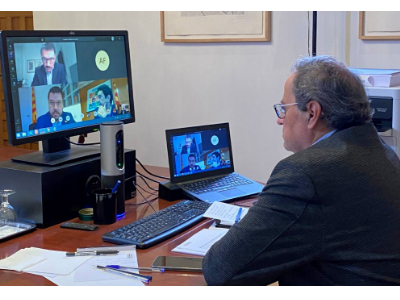- Spokesperson Budó said the Executive Council had approved a new decree-law on measures to mitigate the effects of the coronavirus outbreak
- Minister Vergés reported that over 2,400 health professionals have been hired since the outbreak began and that 134 additional beds have been made available in Barcelona as part of an emergency plan for tackling challenges facing care homes

The Executive Council of the Catalan government has received a report prepared by a group of experts headed by Dr Oriol Mitjà. The Minister of the Presidency and government spokesperson, Meritxell Budó, said: “The report sets out a series of strategic recommendations to guide the Government of Catalonia in the development of our lockdown exit plan.” The report emphasises two measures: 1) social distancing; and 2) identification of cases, contact tracing and isolation of infected individuals. It recommends relaxing the lockdown in five progressive stages based on an EU roadmap and highlights the need to take into account the possibility of resurgences that would require further lockdowns.
As a first step towards a general lockdown exit, the report envisages a partial lifting of the lockdown for minors and the elderly, who would be allowed to go out at different times to mitigate the psychological effects of the restrictions in effect. The report also recommends launching a study to determine what percentage of individuals are serologically positive. Budó said it was important for people to use the STOPCOVID app so that health authorities can continue to monitor symptoms and use of face masks.
Following assessment, the expert report will used by the PROCICAT technical committee to develop Catalonia’s lockdown exit plan.
In the meeting held yesterday, the Executive Council also approved a new decree-law on measures to mitigate the effects of the coronavirus outbreak in Catalonia.
Public services
The Catalan government is keeping its workers mobilised to ensure public services during the COVID-19 crisis. Apart from healthcare workers, the Mossos (Catalan police) and emergency workers, other public employees are providing basic and structural services in the workplace or through teleworking arrangements to ensure the proper functioning of the administration.
The Cybersecurity Agency of Catalonia has analysed risks in this area and taken measures to address them. There has been a 20% increase in email containing malicious code, a 476% increase in compromised credentials, and a 75% increase in attempts to exploit vulnerabilities in the Catalan government’s information systems.
Agriculture sector
The Catalan government is working with agricultural organisations and trade unions to address issues of concern in the sector. A guide to best practice and measures that can be taken to mitigate coronavirus-related risks in agricultural activities is being prepared. It is estimated that 33,000 workers will be needed in the sector in July and August.
Culture sector
Twenty-three entities have submitted proposals through the “Rescue Plan” website of the Catalan Ministry of Culture, and these submissions have been reviewed by the Executive Council. The aim is to provide services and resources to citizens, creators, companies, public and private cultural entities, and booking agents.
Monitoring of measures adopted by other countries
Spokesperson Budó said: “Lockdown measures are being eased at different paces in countries and territories around the world, and the Catalan Ministry for Foreign Action is monitoring international best practice related to the health crisis.” The Ministry has presented a study that reviews measures adopted in 40 countries.
Update from the Catalan Minister of Home Affairs, Miquel Buch
- The volume of traffic in and out of Barcelona remains at a level more than 50% lower than usual. Police are continuing to take action to ensure strict enforcement of lockdown measures.
Update from the Catalan Minister of Health, Alba Vergés
- 2,405 health professionals have been hired since the start of the coronavirus outbreak, including 768 in the 10 days up to Tuesday.
- 134 additional beds will be made available in Barcelona to help tackle the particular challenges facing care homes. The aim is to ease pressure on these facilities and separate residents who have tested positive for Covid-19 from those who have tested negative.
- 20,000 food parcels will be distributed to the elderly, chronically ill and COVID-19 patients in home confinement in Barcelona. 280,000 meals will be sent to 10,000 people over the age of 70.
- The Catalan government is taking into account the impact lockdown measures are having on the emotional health of children and teens. Restrictions will be lifted progressively as the outbreak is brought under control, based on a cautious approach that prioritises safety.
- 27m personal protection products have been received since the start of the outbreak for the protection of health professionals and care home staff. 70% of these supplies were acquired directly through a centralised purchase made by the Catalan government. Additional material has been purchased by hospitals and other facilities through their usual channels.